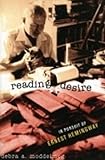Reading Desire : In Pursuit of Ernest Hemingway / Debra A. Moddelmog.
Material type: TextPublisher: Ithaca, NY : Cornell University Press, [2018]Copyright date: ©1999Description: 1 online resource (208 p.) : 3 halftonesContent type:
TextPublisher: Ithaca, NY : Cornell University Press, [2018]Copyright date: ©1999Description: 1 online resource (208 p.) : 3 halftonesContent type: - 9781501728907
- 813/.52 23
- online - DeGruyter
| Item type | Current library | Call number | URL | Status | Notes | Barcode | |
|---|---|---|---|---|---|---|---|
 eBook
eBook
|
Biblioteca "Angelicum" Pont. Univ. S.Tommaso d'Aquino Nuvola online | online - DeGruyter (Browse shelf(Opens below)) | Online access | Not for loan (Accesso limitato) | Accesso per gli utenti autorizzati / Access for authorized users | (dgr)9781501728907 |
Frontmatter -- CONTENTS -- List of Illustrations -- Acknowledgments -- Introduction -- 1. Reading Hemingway Mter the Author's Death and Return -- 2. The Desire for and of the Author: Reconstructing Hemingway -- 3. Casting Out Forbidden Desires from The Garden of Eden: Capitalism and the Production of Hemingway -- 4. Re-Embodying Hemingway's Fiction and Life -- 5. Critical Multiculturalism, Canonized Authors, and Desire -- Notes -- Works Cited -- Index
restricted access online access with authorization star
http://purl.org/coar/access_right/c_16ec
Whether revered for his masculinity, condemned as an icon of machismo, or perceived as possessing complex androgynous characteristics, Ernest Hemingway is acknowledged to be one of the most important twentieth-century American novelists. For Debra A. Moddelmog, the intense debate about the nature of his identity reveals how critics' desires give shape to an author's many guises. In her provocative book, Moddelmog interrogates Hemingway's persona and work to show how our perception of the writer is influenced by society's views on knowledge, power, and sexuality. She believes that recent attempts to reinvent Hemingway as man and as artist have been circumscribed by their authors' investment in heterosexist ideology; she seeks instead to situate Hemingway's sexual identity in the interface between homosexuality and heterosexuality. Moddelmog looks at how sexual orientation, gender, race, nationality, able-bodiedness—and the intersections of these elements—contribute to the formation of desire. Ultimately, she makes a far-reaching and suggestive argument about multiculturalism and the canons of American letters, asserting that those who teach literature must be aware of the politics and ethics of the authorial constructions they promote.
Mode of access: Internet via World Wide Web.
In English.
Description based on online resource; title from PDF title page (publisher's Web site, viewed 26. Apr 2024)


